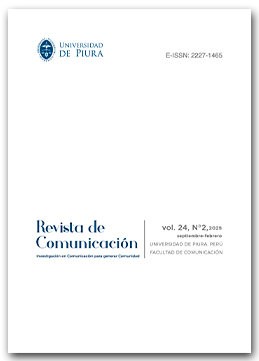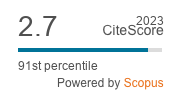Mobilization, equalization, and populist rhetoric on Facebook. Presidential campaigns in Brazil, Colombia, Chile, and Peru
DOI:
https://doi.org/10.26441/RC24.2-2025-3937Keywords:
Political communication, Facebook, election, South America, mobilization, Brazil, Colombia, Chile, PeruAbstract
Purpose. Western democracies have witnessed the emergence of political actors who have gained power through innovative digital mobilization strategies and populist campaign narratives. This study aims to provide an analytical description of the digital communication strategies used by both new and established political actors on Facebook, and to assess the prevalence of populist rhetoric during the most recent presidential elections in Brazil, Colombia, Chile, and Peru. Methodology. A dataset of 2,930 Facebook posts published by candidates and parties during the presidential campaigns was analyzed for the purposes of cross-national comparison. The comparative content analysis was guided by the analytical frameworks developed by the Campaigning for Strasbourg project. Results and conclusions. The findings indicate a trend toward more intensive use of Facebook by new political contenders. The data suggest that populist rhetoric is present across all analyzed campaigns, although it appears more frequently in the social media discourse of opposition parties. At the national level, Colombia stands out as the country where populist discourse and negative campaigning are particularly prevalent. Original contributions. Most existing research on political actors’ use of Facebook and the prevalence of populist rhetoric during electoral campaigns has focused on the United States and Europe. This study contributes to the literature by extending this analysis to South America. The comparative content analysis facilitated the identification of notable differences in the use of Facebook and populist rhetoric, while also revealing specific patterns at both the party and country levels.
Metrics
References
Acuña-Duarte, A., Campos, P., León, J. & Salazar, C. (2024). Tweeting to be a constitution-writer in Chile: Social media activity, public discourse, and electoral outcomes during pandemic times. Technology in society. 79. https://doi.org/10.1016/j.techsoc.2024.102740 DOI: https://doi.org/10.1016/j.techsoc.2024.102740
Alarcón, M., & Cárdenas, C. (2021). Convocatoria de protesta a través de Instagram, un análisis socio cognitivo de estrategias discursivas en el contexto del movimiento social en Chile (2019-2020). Revista Latina de Comunicación Social, 79, 127–149. https://doi.org/10.4185/RLCS-2021-1524 DOI: https://doi.org/10.4185/RLCS-2021-1524
Baviera, T., Sánchez-Junqueras, J. & Rosso, P. (2022). Political advertising on social media: Issues sponsored on Facebook ads during the 2019 General Elections in Spain. Communication & Society, 35(3), 33-49. https://doi.org/10.15581/003.35.3.33-49 DOI: https://doi.org/10.15581/003.35.3.33-49
Brandao, F. (2022). Stabbed Democracy: How Social Media and Home Videos Made a Populist President in Brazil. In: Taras, D. & Davis, R. (Eds), Electoral Campaigns, Media, and the New World of Digital Politics. (pp. 179-199). University of Michigan Press. https://doi.org/10.3998/mpub.12013603.
Bene, M. (2023). Who reaps the benefits? A cross-country investigation of the absolute and relative normalization and equalization theses in the 2019 European Parliament elections. New Media & Society, 25(7), 1708-1727. https://doi.org/10.1177/14614448211019688 DOI: https://doi.org/10.1177/14614448211019688
Bucher, T., & Helmond, A. (2018). The Affordances of Social Media Platforms. In J. Burgess, A. Marwick, & T. Poell (Eds.), The SAGE Handbook of Social Media (pp. 233–253). SAGE. https://doi.org/10.4135/9781473984066.n14 DOI: https://doi.org/10.4135/9781473984066.n14
Cárdenas, A., Ballesteros, C. & Jara, R. (2017). Redes sociales y campañas electorales en Iberoamérica. Un análisis comparativo de los casos de España, México y Chile. Cuadernos.info, (41), 19-40. https://doi.org/10.7764/cdi.41.1259 DOI: https://doi.org/10.7764/cdi.41.1259
Casero-Ripollés, A., Feenstra, R. A., & Tormey, S. (2016). Old and New Media Logics in an Electoral Campaign: The Case of Podemos and the Two-Way Street Mediatization of Politics. The International Journal of Press/Politics, 21(3), 378–397. https://doi.org/10.1177/1940161216645340 DOI: https://doi.org/10.1177/1940161216645340
Castro Riaño, L. (2020). La protesta social en América Latina. Rumbos TS. Un Espacio Crítico Para La Reflexión En Ciencias Sociales, (23), 159-184. https://doi.org/10.51188/rrts.num23.418 DOI: https://doi.org/10.51188/rrts.num23.418
Ceccobelli, D. (2018) Not every day is Election Day: a comparative analysis of eighteen election campaigns on Facebook. Journal of Information Technology & Politics. 15(2), 122–141. https://doi.org/10.1080/19331681.2018.1449701 DOI: https://doi.org/10.1080/19331681.2018.1449701
Ceron, W., Sanseverino, G. G., De-Lima-Santos, M.-F., & Quiles, M. G. (2021). COVID-19 fake news diffusion across Latin America. Social Network Analysis and Mining, 11(1), 47. https://doi.org/10.1007/s13278-021-00753-z DOI: https://doi.org/10.1007/s13278-021-00753-z
Coppedge, M., J. Gerring, C. H., Knutsen, S. I. Lindberg, J. Teorell, N. Alizada, D. Altman et al. (2023). V-Dem Codebook v12. Varieties of Democracy (V-Dem) Project. https://doi.org/10.23696/vdemds23
Coppedge, M., J. Gerring, C. H., Knutsen, S. I. Lindberg, J. Teorell, N. Alizada, D. Altman et al. (2022). V-Dem Codebook v12. Varieties of Democracy (V-Dem) Project. https://doi.org/10.23696/vdemds22
CrowdTangle (2022). A tool from Facebook to help follow, analyze and report on what’s happening across social media. CrowdTangle. http://www.crowdtangle.com
De Vreese, C. H., Esser, F., Aalberg, T., Reinemann, C., & Stanyer, J. (2018). Populism as an Expression of Political Communication Content and Style: A New Perspective. The International Journal of Press/Politics, 23(4), 423-438. https://doi.org/10.1177/1940161218790035 DOI: https://doi.org/10.1177/1940161218790035
Dimitrova, D. V., & Matthes, J. (2018). Social media in political campaigning around the world: Theoretical and methodological challenges. Journalism & mass communication quarterly, 95(2), 333-342. https://doi.org/10.1177/1077699018770437 DOI: https://doi.org/10.1177/1077699018770437
Doroshenko, L. (2022). Populists and Social Media Campaigning in Ukraine: The Election of Volodymyr Zelensky. In: Taras, D. & Davis, R. (Eds), Electoral Campaigns, Media, and the New World of Digital Politics. (pp. 221-243). University of Michigan Press. https://doi.org/10.3998/mpub.12013603
Ernst, N., Engesser, S., Büchel, F., Blassnig, S., & Esser, F. (2017). Extreme parties and populism: an analysis of Facebook and Twitter across six countries. Information, Communication & Society, 20(9), 1347-1364. https://doi.org/10.1080/1369118x.2017.1329333 DOI: https://doi.org/10.1080/1369118X.2017.1329333
Fenoll, V., Gonçalves, I., & Bene, M. (2024). Divisive Issues, Polarization, and Users’ Reactions on Facebook: Comparing Campaigning in Latin America. Politics and Governance, 12, Article 7957. https://doi.org/10.17645/pag.7957 DOI: https://doi.org/10.17645/pag.7957
Fenoll, V. (2022). Political communication on Facebook and populism. The 2019 European Parliament election in Spain. Communication & Society, 35(3), 91-103. https://doi.org/10.15581/003.35.3.91-103 DOI: https://doi.org/10.15581/003.35.3.91-103
Gilmore, J. (2012). Ditching the pack: Digital media in the 2010 Brazilian congressional campaigns. New Media & Society, 14(4), 617- 633. https://doi.org/10.1177/1461444811422429 DOI: https://doi.org/10.1177/1461444811422429
Grassau, D., Valenzuela, S., Bachmann, I., Labarca, C., Mujica, C., Halpern, D., & Puente, S. (2019). Estudio de opinión pública: uso y evaluación de los medios de comunicación y las redes sociales durante el estallido social en Chile. Facultad de Comunicaciones de la Pontificia Universidad Católica de Chile. https://doi.org/10.13140/RG.2.2.36739.63522
Güvercin, D. (2022). Digitalization and populism: Cross-country evidence. Technology in Society, 68, 101802. https://doi.org/10.1016/j.techsoc.2021.101802 DOI: https://doi.org/10.1016/j.techsoc.2021.101802
Guriev, S., & Papaioannou, E. (2022). The Political Economy of Populism. Journal of Economic Literature, 60 (3): 753-832. https://doi.org/10.1257/jel.20201595 DOI: https://doi.org/10.1257/jel.20201595
Handlin, S. (2017). State crisis in fragile democracies: Polarization and political regimes in South America. Cambridge University Press. https://doi.org/10.1017/9781108233682 DOI: https://doi.org/10.1017/9781108233682
Harrison, C., & Zissis, C. (2022, January 6). 2022 Elections in Latin America: A Preview. Americas Society/Council of the Americas. https://www.as-coa.org/articles/2022-elections-latin-america-preview
Haßler, J., Wurst, A.-K. & Schlosser, K. (2021). Analysing European Parliament Election Campaigns Across 12 Countries: A Computer-Enhanced Content Analysis Approach. In J. Haßler, M. Magin, U. Russmann & V. Fenoll (Eds.), Campaigning on Facebook in the 2019 European Parliament Election. Political Campaigning and Communication (pp. 41-52). Palgrave Macmillan. https://doi.org/10.1007/978-3-030-73851-8_3 DOI: https://doi.org/10.1007/978-3-030-73851-8_3
Hawkins, K., & Rovira Kaltwasser, C.. (2017). The ideational approach to populism. Latin American Research Review, 52(4), 513-528. https://doi.org/10.25222/larr.85 DOI: https://doi.org/10.25222/larr.85
Igartua, J. J. (2006). Métodos cuantitativos de investigación en comunicación. Bosch. https://doi.org/10.15581/003.19.37082 DOI: https://doi.org/10.15581/003.19.37082
Jacobs, K., Sandberg, L., & Spierings, N. (2020). Twitter and Facebook: Populists’ double-barreled gun? New Media & Society, 22(4), 611-633. https://doi.org/10.1177/1461444819893991 DOI: https://doi.org/10.1177/1461444819893991
Jagers, J., & Walgrave, S. (2007). Populism as political communication style: An empirical study of political parties' discourse in Belgium. European journal of political research, 46(3), 319-345. https://doi.org/10.1111/j.1475-6765.2006.00690.x DOI: https://doi.org/10.1111/j.1475-6765.2006.00690.x
Jamil Marques, F.P. & Mont’Alverne, C. (2016). How Important is Twitter to Local Elections in Brazil? A Case Study of Fortaleza City Council. Brazilian Political Science Review. 10(3) https://doi.org/10.1590/1981-38212016000300005 DOI: https://doi.org/10.1590/1981-38212016000300005
Kalsnes, B. (2016). The Social Media Paradox Explained: Comparing Political Parties’ Facebook Strategy Versus Practice. Social Media + Society, 2(2). https://doi.org/10.1177/2056305116644616 DOI: https://doi.org/10.1177/2056305116644616
Kefford, G. (2018). Digital Media, Ground Wars and Party Organisation: Does Stratarchy Explain How Parties Organise Election Campaigns? Parliamentary Affairs 71, 656–673. https://doi.org/10.1093/pa/gsx084 DOI: https://doi.org/10.1093/pa/gsx084
Klinger, U., Koc-Michalska, K., & Russmann, U. (2022). Are Campaigns Getting Uglier, and Who Is to Blame? Negativity, Dramatization and Populism on Facebook in the 2014 and 2019 EP Election Campaigns. Political Communication, 40(3), 263-282. https://doi.org/10.1080/10584609.2022.2133198 DOI: https://doi.org/10.1080/10584609.2022.2133198
Koc-Michalska, K., Gibson, R. & Vedel, T. (2014). Online Campaigning in France, 2007–2012: Political Actors and Citizens in the Aftermath of the Web.2.0 Evolution. Journal of Information Technology & Politics, 11 (2), 220-244. https://doi.org/10.1080/19331681.2014.903217 DOI: https://doi.org/10.1080/19331681.2014.903217
Koc-Michalska, K., Lilleker, D.G., Smith, A. & Weissmann, D. (2016). The normalization of online campaigning in the web.2.0 era. European Journal of Communication, 31(3), 331–350. https://doi.org./10.1177/0267323116647236 DOI: https://doi.org/10.1177/0267323116647236
Lampter, M. (2023). The Two Pink Tides in Latin America. Contemporary Global Prospects. Human Affairs, 33(3), 319-334. https://doi.org/10.1515/humaff-2023-0023 DOI: https://doi.org/10.1515/humaff-2023-0023
Levitsky, S., Loxton, J., Van Dick, B. & Dominguez, J. (2016). Challenges of Party Building in Latin América. Introduction. In: Levitsky, S., Loxton, J., Van Dyck, B., & Dominguez, J. Challenges of Party-Building in Latin America. Cambridge University Press. https://doi.org/10.1017/CBO9781316550564 DOI: https://doi.org/10.1017/CBO9781316550564
Lev-On, A., & Haleva-Amir, S. (2016). Normalizing or equalizing? Characterizing Facebook campaigning. New Media & Society, 20(2), 720–739. https://doi.org/10.1177/1461444816669160 DOI: https://doi.org/10.1177/1461444816669160
Lioy, A., & Contreras Medrano, D. (2024). Platform politics in Latin America: Equalizers, normalizers, laggards, and marginals. Information Polity: The International Journal of Government & Democracy in the Information Age, 29(3), 331–350. https://doi.org/10.3233/IP-220073 DOI: https://doi.org/10.3233/IP-220073
Lobera, J., & Portos, M. (2020). Decentralizing electoral campaigns? New-old parties, grassroots and digital activism. Information, Communication & Society, 24(10). 1419–1440. https://doi.org/10.1080/1369118X.2020.1749697 DOI: https://doi.org/10.1080/1369118X.2020.1749697
Londoño, E., Turkewitz, J., & Milhorance F. (2022, January 4). Leftists Are Ascendant in Latin America as Key Elections Loom. The New York Times. https://doi.org/10.1007/s13398-014-0173-7.2
López-López, P. C. & Vásquez-González, J. (2018). Thematic agenda and Twitter: Presidential elections in Latin America during the 2015-2017 period. Profesional de la información, 27(6), 1204-1214. https://doi.org/10.3145/epi.2018.nov.04 DOI: https://doi.org/10.3145/epi.2018.nov.04
Lusoli, W. (2005). The Internet and the European Parliament elections: Theoretical perspectives, empirical investigations and proposals for research. Information Polity. The International Journal of Government & Democracy in the Information Age, 10 (3), 153-163. https://doi.org/10.3233/IP-2005-0080 DOI: https://doi.org/10.3233/IP-2005-0080
Magin, M., Russmann, U., Fenoll, V., & Haßler, J. (2021). Information greater than mobilisation greater than interaction: Contours of a Pan-European style of social media campaigning. In Haßler, J., Magin, M., Russmann, U., & Fenoll, V. (Eds.), Campaigning on Facebook in the 2019 European Parliament Election: Informing, Interacting with, and Mobilising Voters (pp. 303-331). Palgrave Macmillan. https://doi.org/10.1007/978-3-030-73851-8_19 DOI: https://doi.org/10.1007/978-3-030-73851-8_19
Mainwaring, S., & Bizzarro, F. (2018). Democratization without Party System Institutionalization: Cross-National Correlates. In S. Mainwaring (Ed.), Party Systems in Latin America: Institutionalization, Decay, and Collapse (pp. 102-132). Cambridge University Press. https://doi.org/10.1017/9781316798553.005 DOI: https://doi.org/10.1017/9781316798553.005
Margolis M., Resnick D., & Wolfe J. D. (1999). Party competition on the Internet in the United States and Britain. The Harvard International Journal of Press/Politics, 4, 24–47. https://doi.org/10.1177/1081180X9900400403 DOI: https://doi.org/10.1177/1081180X9900400403
Margolis, M., & Resnick, D. (2000). Politics as usual: The cyberspace “revolution”. SAGE publications Inc., https://doi.org/10.4135/9781452233475 DOI: https://doi.org/10.4135/9781452233475
Martínez-Gallardo, C., de la Cerda, N., Hartlyn, J., Hooghe, L., Marks, G. & Bakker, R. (2022). Revisiting party system structuration in Latin America and Europe: Economic and socio-cultural dimensions. Party Politics, 29(4), 780–792. https://doi.org/10.1177/13540688221090604 DOI: https://doi.org/10.1177/13540688221090604
Mayol, A. (2019). Big Bang. Estallido Social 2019. Modelo derrumbado – Sociedad rota – Política inútil. Editorial Catalonia.
McCoy, J., Rahman, T., & Somer, M. (2018). Polarization and the global crisis of democracy: Common patterns, dynamics, and pernicious consequences for democratic polities. American Behavioral Scientist, 62(1), 16-42. https://doi.org/10.1177/0002764218759576 DOI: https://doi.org/10.1177/0002764218759576
Mendiburo-Seguel, A., Alenda, S., Ford, T. E., Olah, A. R., Navia, P. D., Argüello-Gutiérrez, C. (2022). #funnypoliticians: How do Poltical Figures Use Humor on Twitter?. Frontiers in sociology. 7. https://doi.org/10.3389/fsoc.2022.788742 DOI: https://doi.org/10.3389/fsoc.2022.788742
Misión de Observación Electoral de la Unión Europea (2022). Colombia 2022. Informe final. Unión Europea-Misión de observación electoral. https://www.eeas.europa.eu/moe-ue-colombia-2022/informe-final-de-la-moe-ue-colombia-2022_es?s=4512
Montúfar-Calle, Á., Atarama-Rojas, T., & Saavedra-Chau, G. (2022). Análisis de la actividad política en redes sociales durante la primera vuelta electoral de las elecciones generales 2021 en Perú. Revista de Comunicación, 21(1), 273-292. https://doi.org/10.26441/RC21.1-2022-A14 DOI: https://doi.org/10.26441/RC21.1-2022-A14
Mudde, C., & Rovira Kaltwasser, C. (2017). Populism: A very short introduction. Oxford University Press. https://doi.org/10.1093/actrade/9780190234874.001.0001 DOI: https://doi.org/10.1093/actrade/9780190234874.001.0001
Nai, A. (2018). Fear and Loathing in Populist Campaigns? Comparing the Communication Style of Populists and Non-populists in Elections Worldwide. Journal of Political Marketing, 20(2), 219-250. https://doi.org/10.1080/15377857.2018.1491439 DOI: https://doi.org/10.1080/15377857.2018.1491439
Nava, A. (2022). La protesta social en América Latina: los casos de Brasil, Argentina, Colombia y Chile (2018-2021). Anuario Del Conflicto Social, (13), e–39616. https://doi.org/10.1344/ACS2022.13.2 DOI: https://doi.org/10.1344/ACS2022.13.2
Neuendorf, K. A. (2016). The content analysis guidebook. Sage. https://doi.org/10.4135/9781071802878 DOI: https://doi.org/10.4135/9781071802878
Newman, N., Fletcher, R., Robertson, C. T., Ross Arguedas, A., & Nielsen, R. K. (2024). Reuters Institute digital news report 2024. Reuters Institute for the study of Journalism. https://reutersinstitute.politics.ox.ac.uk/digital-news-report/2024
Norris, P., & Inglehart, R. (2019). Cultural Backlash. Trump, Brexit, and Authoritarian Populism. New York: Cambridge University Press. https://doi.org/10.1017/9781108595841 DOI: https://doi.org/10.1017/9781108595841
Parkin Daniels, J. (2021). The Pandemic’s Legacy Will Spur New Protests in Latin America. Foreign Policy, July 29. https://foreignpolicy.com/2021/07/29/pandemic-protests-latin-america-colombia-brazil-chile/
Peña‑Vicuña, P., Fenoll, V., & Romero‑Lizama, P. (2024). Elecciones Chile 2021: populismo, temas divisivos y triunfo de los nuevos partidos en Facebook. Cuadernos.info, (58), 208–229. https://doi.org/10.7764/cdi.58.65957 DOI: https://doi.org/10.7764/cdi.58.65957
Power, S. & Mason, B. (2021). Mobilizing or Chasing Voters on Facebook? Analysing Echo-Chamber Effects at the UK Parliamentary General Election 2019. Parliamentary Affairs, 76, 1–21 https://doi.org/10.1093/pa/gsab043 DOI: https://doi.org/10.1093/pa/gsab043
Restrepo Echavarría, N. J., & González Tule, L. A. (2021). Uso intensivo de herramientas y recursos de profesionalización política en campañas presidenciales: el caso de Colombia 2018. Cuadernos.Info, 48, 48–71. https://doi.org/10.7764/cdi.48.27921 DOI: https://doi.org/10.7764/cdi.48.27921
Roberts, K. M. (2021). Populism and Polarization in Comparative Perspective: Constitutive, Spatial and Institutional Dimensions. Government and Opposition, 57(4), 680-702. https://doi.org/10.1017/gov.2021.14 DOI: https://doi.org/10.1017/gov.2021.14
Ridout, T., Fowler, E. & Franz, M. (2021) The Influence of Goals and Timing: How Campaigns Deploy Ads on Facebook. Journal of Information Technology & Politics, 18(3), 293–309. https://doi.org/10.1080/19331681.2021.1874585 DOI: https://doi.org/10.1080/19331681.2021.1874585
Rodarte, A. K., & Lukito, J. (2024). Does Social Media Level the Political Field or Reinforce Existing Inequalities? Cartographies of the 2022 Brazilian Election. Political Communication, 42(3), 382–404. https://doi.org/10.1080/10584609.2024.2439320 DOI: https://doi.org/10.1080/10584609.2024.2439320
Rosenberg, A., Saldaña, M., & Porath, W. (2023). Engaged and Uncivil? Incivility and Engagement on Twitter Over a Televised Presidential Debate in Chile. International Journal of Communication, 17, 25. https://ijoc.org/index.php/ijoc/article/view/18496
Saldaña, M., Orchard, X., Rivera, S., & Bustamante-Pavez, G. (2024). “Your house won’t be yours anymore!” Effects of Misinformation, News Use, and Media Trust on Chile’s Constitutional Referendum. The International Journal of Press -Politics. https://doi.org/10.1177/19401612241298853 DOI: https://doi.org/10.1177/19401612241298853
Samuel-Azran, T., Yarchi, M., & Wolfsfeld, G. (2015). Equalization versus Normalization: Facebook and the 2013 Israeli Elections. Social Media + Society, 1(2). https://doi.org/10.1177/2056305115605861 DOI: https://doi.org/10.1177/2056305115605861
Santos, M., Park, C. S., Bastos dos Santos, J. G., Cavalini, A., & Gil de Zúñiga, H. (2025). Latent bombs of disinformation. Information, Communication & Society, 1–22. https://doi.org/10.1080/1369118X.2025.2492575 DOI: https://doi.org/10.1080/1369118X.2025.2492575
Taras, D., & Davis, R. (Eds.). (2022). Electoral Campaigns, Media, and the New World of Digital Politics. University of Michigan Press. https://doi.org/10.3998/mpub.12013603 DOI: https://doi.org/10.3998/mpub.12013603
Teixeira de Barros, A., Brum, C., Ferri, C. & Busanello, E. (2022). Digital Mandates and Their Management: Strategies for Usage of Social Media by Brazilian Federal Legislators. Parliamentary Affairs, 75, 887–903. https://doi.org/10.1093/pa/gsab046 DOI: https://doi.org/10.1093/pa/gsab046
Temitayo, I., Uchechukwu, G., Olawale, O., & Opeyemi, A. (2021). Political hibernation in-between elections? Exploring the online communication and mobilisation capacities of Nigeria's political parties. Journal of Public Affairs, 22(1). https://doi.org/10.1002/pa.2804 DOI: https://doi.org/10.1002/pa.2804
Valenzuela Tábora, K., Rodríguez-Virgili, J., & López Pan, F. (2023). El populismo en las campañas electorales: análisis de los spots en las elecciones presidenciales de 2015 y 2019 en Guatemala. Revista de Comunicación, 22(1), 453–474. https://doi.org/10.26441/RC22.1-2023-3069 DOI: https://doi.org/10.26441/RC22.1-2023-3069
Van Aelst, P., Sheafer, T., & Stanyer, J. (2012). The personalization of mediated political communication: A review of concepts, operationalizations and key findings. Journalism, 13(2), 203-220. https://doi.org/10.1177/1464884911427802 DOI: https://doi.org/10.1177/1464884911427802
Wiesehomeier, N., Singer, M., & Ruth-Lovell, S. P. (2021). Political Representation, Executives, and Political Parties Survey: Data from Expert Surveys in 18 Latin American Countries, 2018-2019. PREPPS Latam V2. https://doi.org/10.7910/DVN/JLOYIJ
Wirth, W., Esser, F., Wettstein, M., Engesser, S., Wirz, D., Schulz, A., ... & Schemer, C. (2016). The appeal of populist ideas, strategies and styles: A theoretical model and research design for analyzing populist political communication. National Centre of Competence in Research (NCCR): Challenges to Democracy in the 21st Century, 1-60. https://doi.org/10.5167/uzh-127461
Zulianello, M., & Larsen, E. G. (2023). Blurred positions: The ideological ambiguity of valence populist parties. Party Politics, 30(1), 190-199. https://doi.org/10.1177/13540688231161205 DOI: https://doi.org/10.1177/13540688231161205
Downloads
Published
How to Cite
Issue
Section
License
Copyright (c) 2025 Revista de Comunicación

This work is licensed under a Creative Commons Attribution-NonCommercial-NoDerivatives 4.0 International License.












 Portal de Revistas de la Universidad de Piura.
Portal de Revistas de la Universidad de Piura.